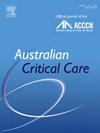The mediating effect of resilience on the relationship between alarm fatigue and burnout among critical care nurses
IF 2.7
3区 医学
Q2 CRITICAL CARE MEDICINE
引用次数: 0
Abstract
Background
Burnout is a common problem in intensive care units and may be related to exposure to high levels of alarms.
Objectives
The aims of this study were to identify factors influencing burnout among critical care nurses and to examine the role of resilience in mediating the relationship between alarm fatigue and burnout.
Methods
A cross-sectional correlational design was used with 306 critical care nurses in critical and intensive care units in Ha'il City, Saudi Arabia's public hospitals from June to August 2024. A path analysis was conducted using the AMOS 23.0 software.
Results
Multiple linear regression analysis revealed that being Saudi (p = 0.033), having more years of experience (p = 0.020), and having a higher alarm fatigue score or lower resilience were significant predictors of higher emotional exhaustion. Having more years of experience (p < 0.001), higher alarm fatigue scores (p = 0.001), and lower resilience (p < 0.001) were significant predictors of higher depersonalisation. Alarm fatigue had an indirect impact on emotional exhaustion and depersonalisation (β = 0.12, p < 0.001 and β = 0.09, p < 0.001, respectively). Furthermore, alarm fatigue had a significant positive direct effect on emotional exhaustion and depersonalisation (β = 0.31, p < 0.001 and β = 0.19, p = 0.011, respectively) and a negative direct effect on resilience and personal achievement (β = −0.32, p < 0.001 and β = −0.25, p < 0.001, respectively). In addition, alarm fatigue had a total positive effect on emotional exhaustion and depersonalisation (β = 0.43, p < 0.001 and β = 0.28, p = 0.001, respectively) and a negative effect on personal achievement (β = −0.28, p < 0.001). Resilience had a direct negative effect on emotional exhaustion and depersonalisation (β = −0.37, p < 0.001 and β = −0.28, p < 0.001, respectively).
Conclusion
The findings revealed a high prevalence of emotional exhaustion and depersonalisation coupled with low levels of personal accomplishment. Resilience partially mediates the relationship between alarm fatigue, emotional exhaustion, and depersonalisation. Healthcare institutions must initiate proper alarm systems and training programs to help mitigate unnecessary alarms and empower resilience among nurses.
心理弹性在危重病护士报警疲劳与倦怠关系中的中介作用
职业倦怠是重症监护病房的常见问题,可能与暴露于高水平的警报有关。目的探讨重症护理护士职业倦怠的影响因素,并探讨心理弹性在报警疲劳与职业倦怠之间的中介作用。方法采用横断面相关设计,对沙特阿拉伯哈伊勒市公立医院2024年6 - 8月重症监护病房306名重症监护护士进行调查。采用AMOS 23.0软件进行通径分析。结果多元线性回归分析显示,沙特人(p = 0.033)、经验年限(p = 0.020)、警铃疲劳评分较高或心理恢复能力较低是情绪耗竭程度较高的显著预测因子。有更多年的工作经验(p <;0.001)、较高的报警疲劳评分(p = 0.001)和较低的恢复力(p <;0.001)是高度人格解体的显著预测因子。警报疲劳对情绪耗竭和人格解体有间接影响(β = 0.12, p <;0.001和β = 0.09, p <;分别为0.001)。此外,警报疲劳对情绪耗竭和人格解体有显著的正向直接影响(β = 0.31, p <;0.001和β = 0.19, p = 0.011),对心理弹性和个人成就的直接负向影响(β = - 0.32, p <;0.001和β = - 0.25, p <;分别为0.001)。此外,警报疲劳对情绪耗竭和人格解体有总体正向影响(β = 0.43, p <;0.001和β = 0.28, p = 0.001)和对个人成就的负向影响(β = - 0.28, p <;0.001)。心理弹性对情绪耗竭和人格解体有直接的负向影响(β = - 0.37, p <;0.001和β = - 0.28, p <;分别为0.001)。结论情绪衰竭和人格解体的发生率高,且个人成就感低。弹性部分介导警报疲劳、情绪耗竭和人格解体之间的关系。医疗机构必须启动适当的警报系统和培训计划,以帮助减少不必要的警报,并增强护士的应变能力。
本文章由计算机程序翻译,如有差异,请以英文原文为准。
求助全文
约1分钟内获得全文
求助全文
来源期刊

Australian Critical Care
NURSING-NURSING
CiteScore
4.90
自引率
9.10%
发文量
148
审稿时长
>12 weeks
期刊介绍:
Australian Critical Care is the official journal of the Australian College of Critical Care Nurses (ACCCN). It is a bi-monthly peer-reviewed journal, providing clinically relevant research, reviews and articles of interest to the critical care community. Australian Critical Care publishes peer-reviewed scholarly papers that report research findings, research-based reviews, discussion papers and commentaries which are of interest to an international readership of critical care practitioners, educators, administrators and researchers. Interprofessional articles are welcomed.
 求助内容:
求助内容: 应助结果提醒方式:
应助结果提醒方式:


